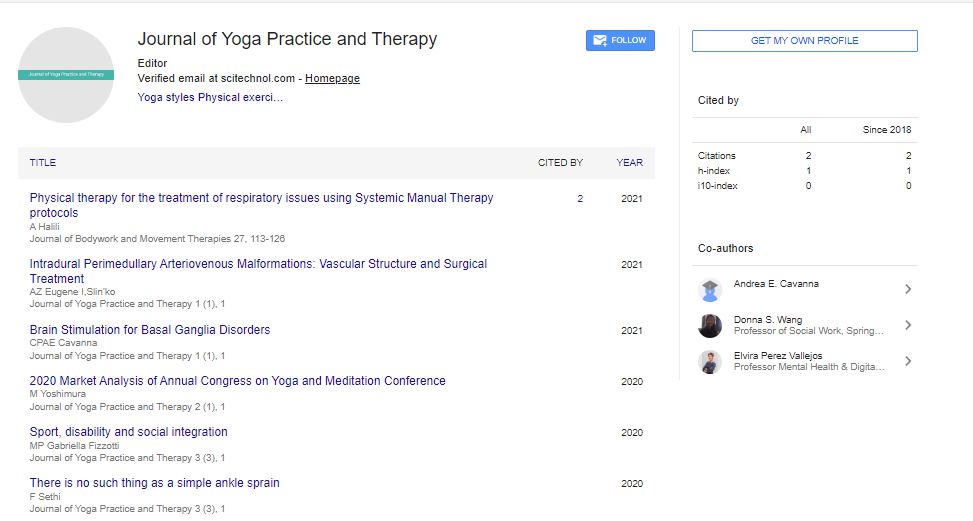Opinion Article, Vol: 6 Issue: 1
The Psychosocial Elements of Sports Medicine in Paediatric Athletes
Kai-Uwe Bletzinger*
Division of Applied Mathematics, Brown University, 182 George St, Providence, RI, 02912, USA
*Corresponding Author: Kai-Uwe Bletzinger
Division of Applied Mathematics,
Brown University, 182 George St, Providence, RI, 02912, USA
E-mail: kaiuwe@tum.de
Received date: 27 February, 2023, Manuscript No JYPTY-23-93466;
Editor assigned date: 01 March, 2023, Pre QC No. JYPTY-23-93466(PQ);
Reviewed date: 15 March, 2023, QC No. JYPTY-23-93466;
Revised date: 22 March, 2023, Manuscript No. JYPTY-23-93466(R);
Published date: 29 March, 2023, DOI: 10.4172/jypty.1000116
Citation: Bletzinger KU (2023) The Psychosocial Elements of Sports Medicine in Paediatric Athletes. Int J Yoga Therap 6:1.
Description
Paediatric athletes are children and adolescents who participate in sports and athletic activities. These activities can range from recreational sports to competitive events at a national or international level. Participation in sports can have numerous benefits for paediatric athletes, including physical fitness, social development, and improved self-esteem. However, it is important to ensure that these young athletes are engaging in safe and appropriate activities. Parents, coaches, and medical professionals should work together to ensure that paediatric athletes are following proper training techniques, using appropriate equipment, and taking necessary precautions to prevent injury. It is also important to monitor the physical and emotional wellbeing of these young athletes to ensure that they are not overtraining or experiencing burnout. Overall, it is important to promote a healthy and safe environment for paediatric athletes to allow them to fully enjoy the benefits of sports participation. The psychosocial elements of sports medicine refer to the psychological and social factors that influence an athlete's physical and mental well-being. These elements can impact an athlete's performance, motivation, and ability to recover from injuries. It encompasses a wide range of medical specialties, including orthopedics, physical therapy, sports psychology, and nutrition.
Sports medicine for paediatric athletes involves not only physical health but also psychosocial well-being. Here are some of the psychosocial elements that should be considered in sports.
Medicine for paediatric athletes
Emotional well-being: Paediatric athletes may face a range of emotions related to their athletic performance, including anxiety, frustration, disappointment, and pressure to succeed. Sports medicine practitioners should be attuned to these emotions and help athletes develop coping strategies.
Social support: The support of family, coaches, and teammates can be a critical factor in a paediatric athlete's success and well-being. Sports medicine practitioners should encourage athletes to build strong relationships with their support system and provide resources for building social support.
Body image: Paediatric athletes may feel pressure to conform to certain body types or appearances. Sports medicine practitioners should help athletes develop a positive body image and provide resources for promoting healthy body image.
Academic performance: Balancing athletic commitments with academic responsibilities can be a challenge for paediatric athletes. Sports medicine practitioners should work with athletes to develop time management strategies and provide resources for academic support.
Goal setting: Goal setting can be an important motivator for paediatric athletes. Sports medicine practitioners should work with athletes to set realistic, achievable goals that are aligned with their values and priorities.
Injury management: Injuries can be a source of stress and anxiety for paediatric athletes. Sports medicine practitioners should provide support and resources for managing injuries and returning to sport in a safe and effective manner.
Overall, sports medicine for paediatric athletes should take a holistic approach that considers both physical and psychosocial factors. By addressing these psychosocial elements, sports medicine practitioners can help paediatric athletes develop the skills and resources they need to thrive both on and off the field.
 Spanish
Spanish  Chinese
Chinese  Russian
Russian  German
German  French
French  Japanese
Japanese  Portuguese
Portuguese  Hindi
Hindi 